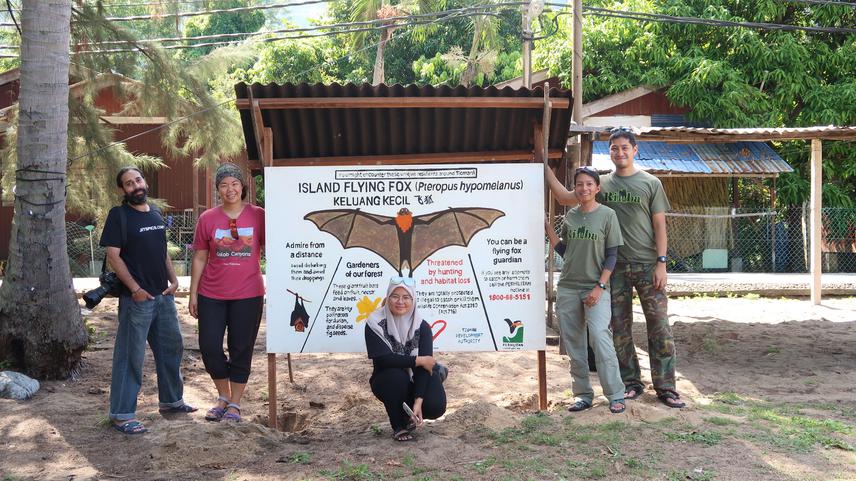Sheema Abdul Aziz
Other projects
11 May 2015
Project Pteropus: Interactions between Flying Foxes, Plants and People on Tioman Island – Implications for Conservation
25 Feb 2020
Project Pteropus Phase 3: Understanding Bat-Plant Interactions to Protect Ecosystems in Peninsular Malaysia
1. To identify current roost sites of P. hypomelanus and P. vampyrus throughout Peninsular Malaysia in order to obtain baseline population data on P. hypomelanus, and update roost and population data for P. vampyrus.
2. To identify key fruit orchards/plantations in Peninsular Malaysia where bat pollination and/or fruit raiding could potentially occur.
3. To support outreach efforts targeted at raising awareness of bat ecosystem services and promoting positive attitudes towards flying foxes.

Old World plant-visiting bats (Pteropodidae) are important ecosystem service providers, pollinating flowers and dispersing seeds over long distances. They are crucial for maintaining the health of tropical ecosystems. Yet negative attitudes towards fruit bats still persist, and they are often viewed as pests. Thus, bats are not charismatic flagship species, and there is little motivation to conserve them. This could have serious repercussions for ecosystem health. Therefore, there is an urgent need to strengthen the cause for bat conservation. Understanding bat ecosystem services and conflict situations with humans is a necessary step to develop effective conservation solutions for Malaysia.
I will build upon the work and information already generated by Phase 1 of Project Pteropus to expand on my efforts to promote the bat conservation agenda within Peninsular Malaysia. Flying foxes (Pteropus spp.) will be used as a flagship, umbrella animal group to initiate conservation actions that will also benefit other associated bat species. I will focus on the role of bats as major pollinators for durian, as I believe this crucial information can help promote bat-friendly attitudes and behaviours in Southeast Asia. Additionally, further elucidating the pollination services of the cave nectar bat (Eonycteris spelaea) can provide a powerful argument for protecting threatened limestone ecosystems.
I will also explore potential collaborations with fruit farmers in Peninsular Malaysia to investigate whether bats are visiting and either pollinating or raiding fruit trees, and to identify outreach and awareness-raising needs. Awareness materials will be produced to support community outreach and conflict management on Tioman Island conducted by a local site-based NGO, Reef Check Malaysia. Concurrently, we will also collect baseline population data of flying foxes from roost sites across the peninsula, in collaboration with the Department of Wildlife and National Parks (DWNP) in order to initiate protection of colonies and their habitats.